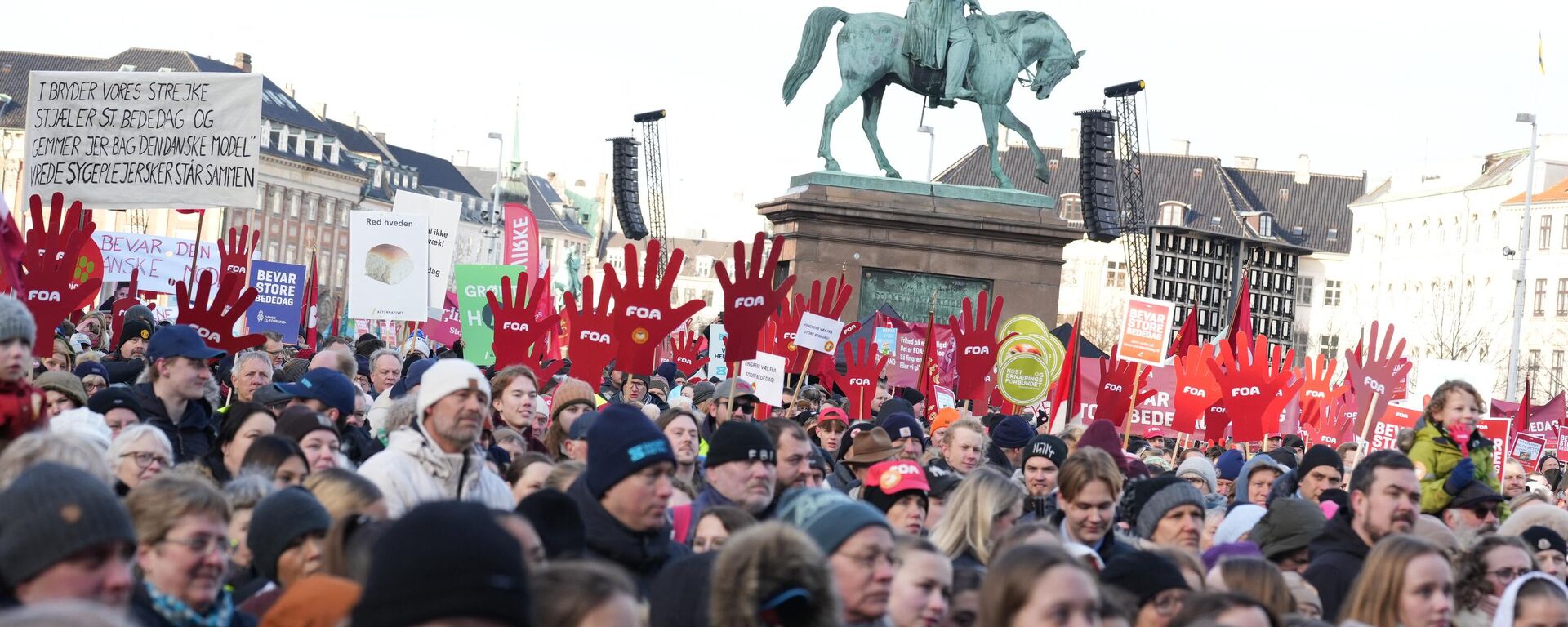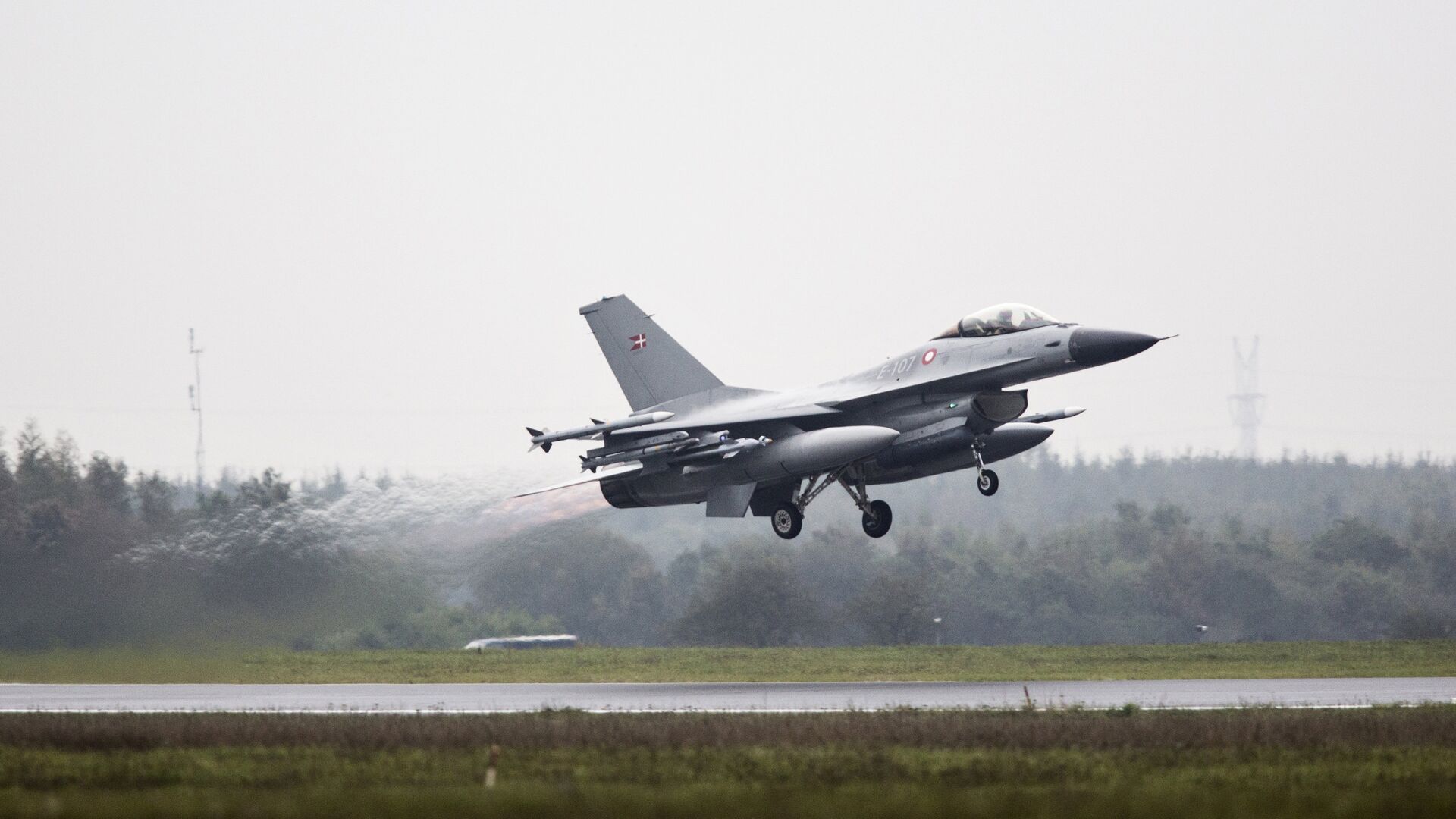https://sputnikglobe.com/20230301/danes-lose-public-holiday-for-first-time-in-250-years-over-military-spending-1107890241.html
Danes Lose Public Holiday For First Time in 250 Years Over Military Spending
Danes Lose Public Holiday For First Time in 250 Years Over Military Spending
Sputnik International
The centuries-old Great Prayer Day will be abolished to finance defense spending, as Copenhagen's involvement in the Ukrainian conflict has depleted the nation's war chest.
2023-03-01T05:36+0000
2023-03-01T05:36+0000
2023-03-01T05:36+0000
world
scandinavia
news
history
christianity
religion
holiday
denmark
military spending
https://cdn1.img.sputnikglobe.com/img/104810/51/1048105173_0:56:3000:1744_1920x0_80_0_0_37609f3cf7403cc11568639bd718ead2.jpg
As of 2024, Danes will work an extra day as the coalition government led by the Social Democrats decided to abolish the historic Great Prayer Day public holiday despite widespread discontent and protests.The Great Prayer Day was formally introduced in 1686, 337 years ago, as a day of fasting and penance. Today, it is still popular among both secular and religious Danes and is linked with many traditions, such as eating warm wheat buns. Many churches around the country use the holiday to perform confirmations.At first it was said that Great Prayer Day would be abolished so that defense spending could be increased, since Copenhagen's involvement in the Ukrainian conflict through arms donations and extensive training has depleted the nation's war chest.Subsequently, though, it was estimated that the additional DKK 3.2Bln ($460Mln) resulting from an extra day's work will benefit not only the armed forces. The government subsequently switched to more palatable buzzwords such as "welfare" and "green transition". Still, Prime Minister Mette Frederiksen cited the present "security policy situation" as the main reason.Regardless of the reason, however, the decision to abolish the long-standing and cherished holiday sparked resistance and criticism from politicians, trade unions and the scientific community.The chairman of the opposition Danish People's Party, Morten Messerschmidt, slammed the government for removing "part of the tradition that has been handed down through through generations and centuries".Laust Hogedahl, labor market researcher at Aalborg University, suggested that this development is contrary to what Danish wage-earners want.A public holiday in Denmark was last abolished 253 years ago when major holiday reform was held by King Christian VII. The number of holidays was nearly halved then. The official reasoning was to engender respect for the remaining holidays and not squander them getting drunk, gambling and whoring. However, the real reason was that Danish agriculture needed more labor, and the state coffers needed more money, a situation reminiscent of the present day.
https://sputnikglobe.com/20230206/thousands-of-danes-clamor-against-removing-christian-holiday-for-war-spending-1107006770.html
scandinavia
denmark
Sputnik International
feedback@sputniknews.com
+74956456601
MIA „Rossiya Segodnya“
2023
News
en_EN
Sputnik International
feedback@sputniknews.com
+74956456601
MIA „Rossiya Segodnya“
Sputnik International
feedback@sputniknews.com
+74956456601
MIA „Rossiya Segodnya“
danish holidays, conflict in ukraine, danish military, coalition government, christian traditions
danish holidays, conflict in ukraine, danish military, coalition government, christian traditions
Danes Lose Public Holiday For First Time in 250 Years Over Military Spending
Public holidays in Denmark were last abolished in 1770 when the nation faced somewhat similar fiscal issues and the Danish state coffers badly needed more money. Today, however, the state's meddling in the realms of holidays and pay was met with political resistance and called "startling and controversial" by experts.
As of 2024, Danes will work an extra day as the coalition government led by the Social Democrats decided to abolish the historic Great Prayer Day public holiday despite widespread discontent and protests.
The Great Prayer Day was formally introduced in 1686, 337 years ago, as a day of fasting and penance. Today, it is still popular among both secular and religious Danes and is linked with many traditions, such as eating warm wheat buns. Many churches around the country use the holiday to perform confirmations.
At first it was said that Great Prayer Day would be abolished so that defense spending could be increased, since Copenhagen's involvement in the Ukrainian conflict through arms donations and extensive training has depleted the nation's war chest.
Subsequently, though, it was estimated that the additional DKK 3.2Bln ($460Mln) resulting from an extra day's work will benefit not only the armed forces. The government subsequently switched to more palatable buzzwords such as "welfare" and "green transition". Still, Prime Minister Mette Frederiksen cited the present "
security policy situation" as the main reason.

6 February 2023, 07:22 GMT
Regardless of the reason, however, the decision to abolish the long-standing and cherished holiday sparked resistance and criticism from politicians, trade unions and the scientific community.
The chairman of the opposition Danish People's Party, Morten Messerschmidt, slammed the government for removing "part of the tradition that has been handed down through through generations and centuries".
"Your names must live on in Danish history for that betrayal of yours, which is to intervene in Danish traditions and Danish culture," Messerschmidt told Danish media.
Laust Hogedahl, labor market researcher at Aalborg University, suggested that this development is contrary to what Danish wage-earners want.
"They are happy about their holidays and taking time off. At the same time, there are a lot of traditions associated with the holidays. Many people have traditions on those days, both church and non-church," Hogedahl told Danish media, branding the state's intervention in the subject of holidays and pay "both sensational and controversial".
A public holiday in Denmark was last abolished 253 years ago when major holiday reform was held by King Christian VII. The number of holidays was nearly halved then. The official reasoning was to engender respect for the remaining holidays and not squander them getting drunk, gambling and whoring. However, the real reason was that Danish agriculture needed more labor, and the state coffers needed more money, a situation reminiscent of the present day.



